Sustainability (MOS) Results
For the material issues identified by the Mitsubishi Chemical Group, targets are set and progress is measured with the Management of Sustainability (MOS) Indices. We will proceed steadily with initiatives on material issues by monitoring the yearly progress of each index.
Progress of the MOS Indices
Material issues for business portfolio strategies / Material issues for environmental and social impacts
Percentage of sales revenue from the growth businesses (businesses that contribute to resolving social issues) / Percentage of sales revenue from products that contribute to the circular economy or mitigate and adapt to climate change*
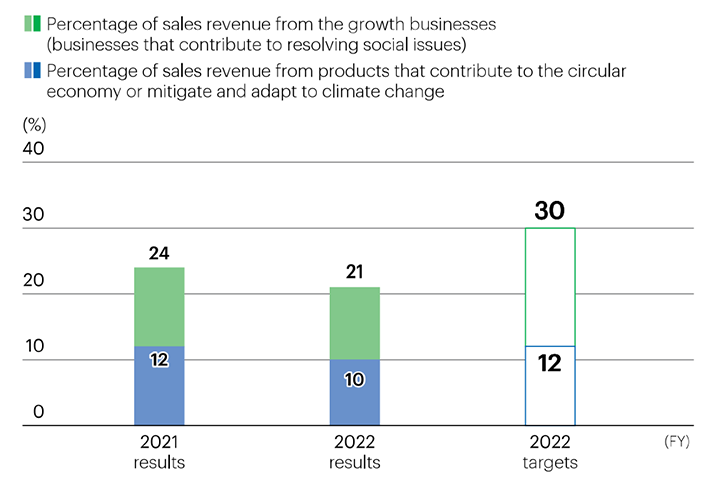
* GHG reduction and carbon cycle sectors among growth businesses (businesses that contribute to resolving social issues)
Although the relevant businesses returned solid sales revenue, the target was not reached. We will continue to concentrate resources on expanding sales of products that embody MCG Group strengths in focus markets such as EVs and bioplastics. We aim to expand the percentage of sales revenue from sustainability-related products* to 20% by fiscal 2025.
* Products that contribute to sustainability, particularly those relating to climate change, circular economy, food supply, and conservation of water resources
Material issues for environmental and social impacts
Rate of reduction of GHG emissions (Japan, compared to FY2013)
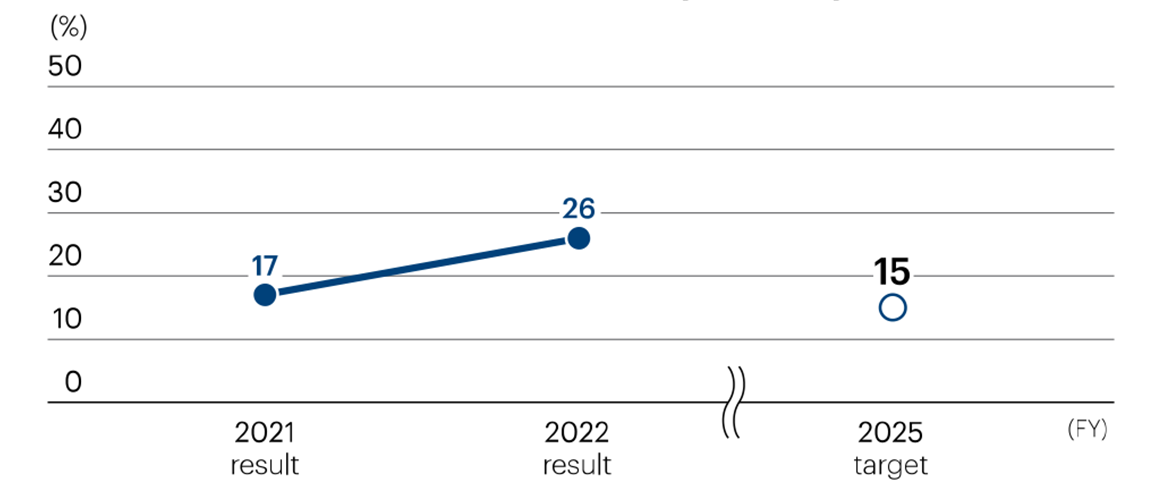
COD (Japan)
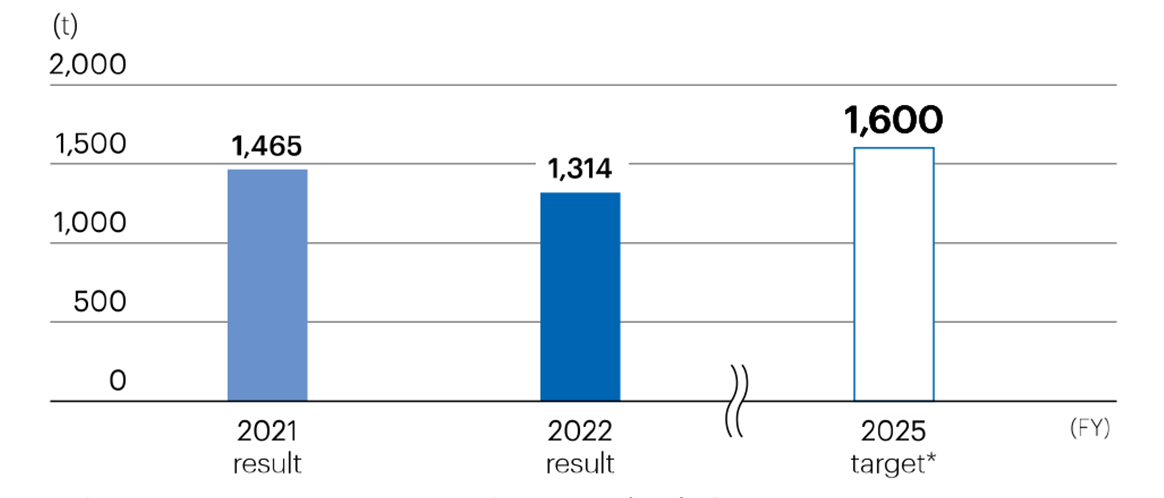
* The FY2025 target is to maintain the FY2019 level of 1,600 tons
Rate of reduction of landfill waste* (Japan, compared to FY2019)
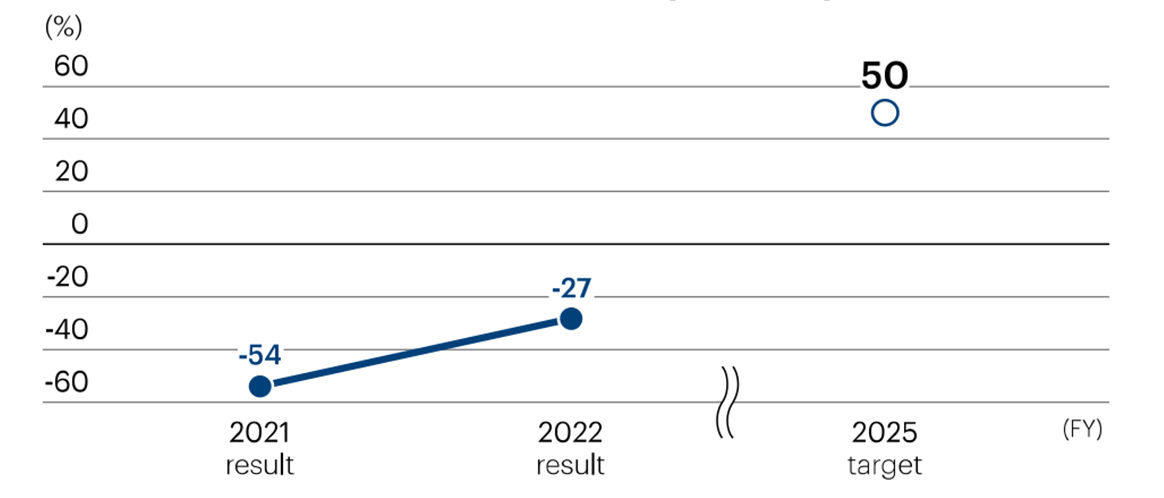
* Amount of landfill waste regularly generated in the Company’s routine production and logistics activity
Progress in LCA activities
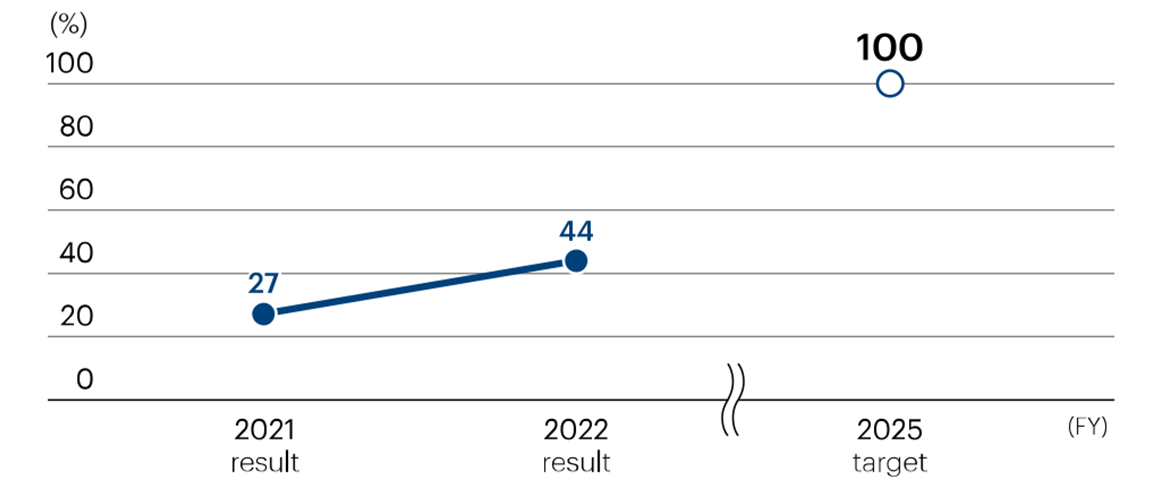
As a step toward reducing environmental impact, resolving the issues of climate change and water resources, and building a recyclingoriented society, we have established indices to measure GHG emissions and waterand wasterelated impacts and set associated targets.
We achieved a 26% reduction in GHG emissions in Japan compared to fiscal 2013 through increased production efficiency and upgrading of facilities combined with the effect of reduced production volumes at our main business sites. In the area of waste, where improved progress toward our target is needed, we are investigating business sites emitting high volumes of landfill waste to establish the cause.
We will carry on working to reduce waste through continuing efforts to boost production yields and improve recycling rates.
Additionally, the Group is rolling out LCA to enable us to quantify and evaluate our environmental impact and carbon footprint. We have established goals such as working to use LCA as a management tool and are aiming to eventually progress to making full usage of LCA (see next column).
Examples of LCA application
The MCG Group uses LCA as a tool toward achieving carbon neutrality. Specifically, we apply it in a range of settings, from R&D and manufacturing to product proposal, in each of which it supports GHG reduction initiatives. Going forward, we will seek to expand its domains of application while accumulating relevant expertise.
Achievements
● Confirmed reduction in GHGs by switching to biomass raw material at the initial exploratory stage of R&D.
● Confirmed reduction in product carbon footprint through recycling and effective use of byproducts of the manufacturing stage.
● Based on hotspot analysis of products, we explored GHG reduction, taking account both the practical feasibility of proposed improvements and their effect on carbon footprint, before presenting our customer with a carbon footprint reduction plan.
Hotspot analysis
This enables us to establish a breakdown of the environmental impact of products for each life-cycle factor in order to identify those with the highest impact and thereby facilitate proposals to reduce environmental burden.
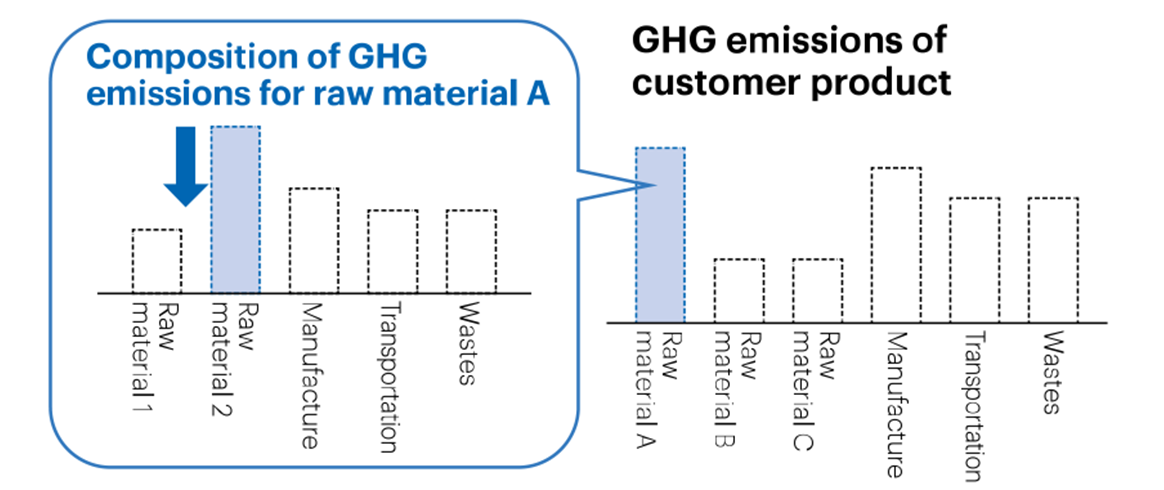
Material issues for business foundations
Level of customer satisfaction
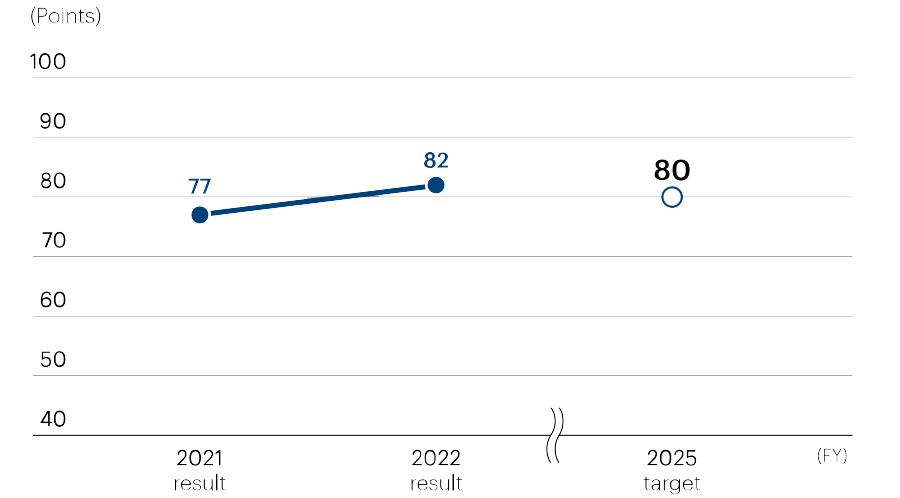
The MCG Group creates a variety of opportunities to engage in active and constructive dialogue with customers and other stakeholders as a way of promoting collaboration to realize KAITEKI. We value feedback from our customers and carry out an annual customer survey so that we can provide better services and improve customer satisfaction. In addition to satisfaction with services and products, the survey covers customer awareness of our sustainability initiatives and other items that allow us to track customer evaluation of the Group from multiple perspectives. The survey results help us to gauge the level of customer satisfaction, strengthen our relationship with customers, and promote sustainable growth.
Employee engagement* / Wellness awareness*
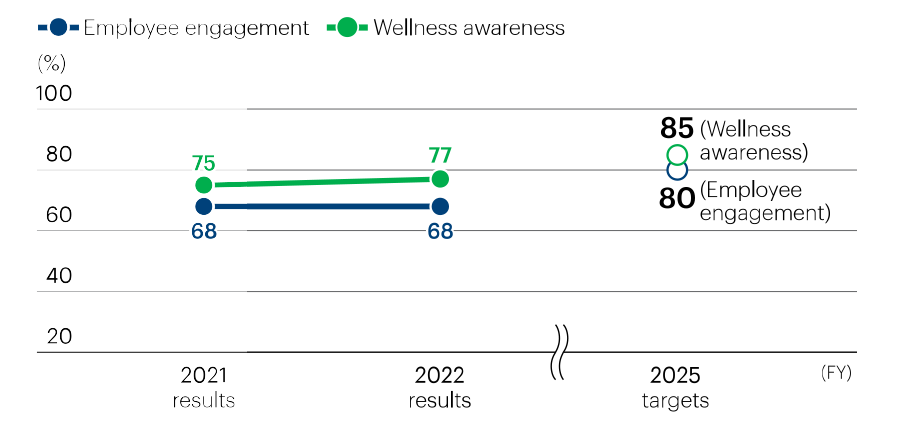
* Percentage of favorable responses to set items in the employee awareness survey
By raising employee engagement and wellness awareness and thereby enabling employees to reach their full potential, the MCG Group aims to achieve higher levels of creativity and productivity.
Diversity among management
| FY2022 result | Result as of April 1, 2023 | FY2025 target |
|---|---|---|
| 24% | 28% | 40% |
We use the diversity of our management as an index to promote greater diversity among the management team and in turn ensure that management decisions are made by personnel with a wide range of experiences. Going forward, we will monitor this indicator based on a new definition that will give greater emphasis to globality and gender. In fiscal 2022, the proportion of management personnel with one of these two diversity attributes was 24%, but we are rolling out measures toward a fiscal 2025 target of 40%.
Evaluation related to the ESG stock index
In recognition of the MCG Group’s initiatives, we have been included continuously in the ESG stock indices indicated below (as of June 30, 2023).
Going forward, we will continue to review the insights and issues identified from the evaluation results and use them to further enhance relevant activities.
Dow Jones Sustainability Indices
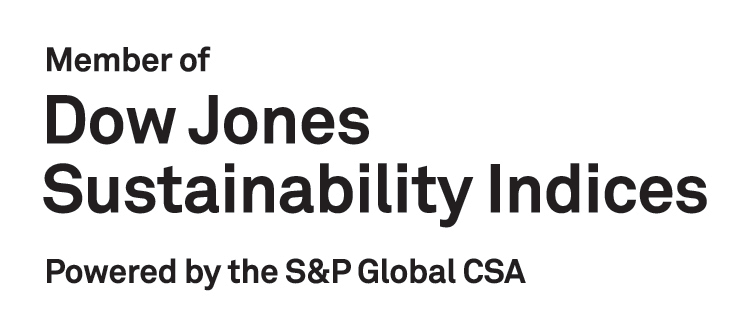
MSCI Japan ESG Select Leaders Index*

MSCI Japan Empowering Women Index*

* The inclusion of the MCG Group in any MSCI Index, and the use of MSCI logos, trademarks, service marks or index names herein, do not constitute a sponsorship, endorsement, or promotion of MCG by MSCI or any of its affiliates. The MSCI Indexes are the exclusive property of MSCI. MSCI and the MSCI index names and logos are trademarks or service marks of MSCI or its affiliates.
FTSE4Good Index Series
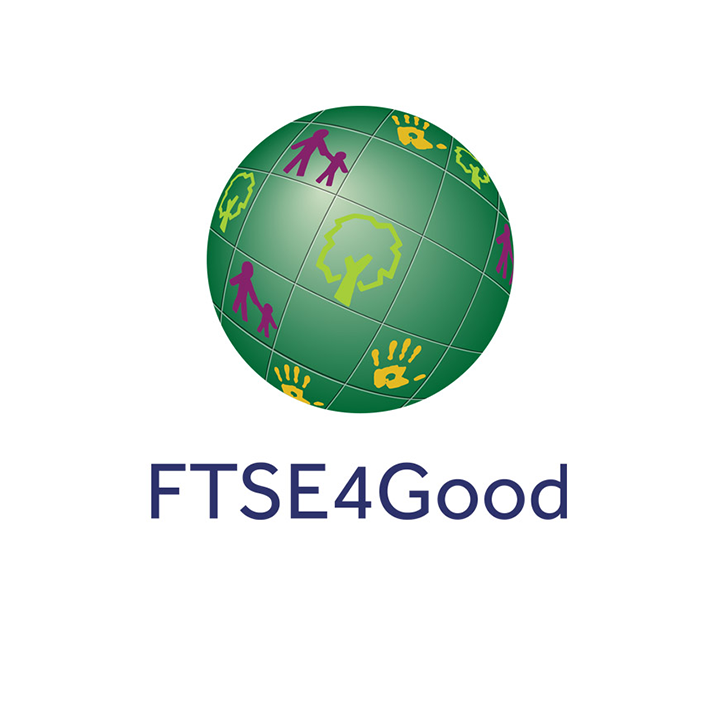
FTSE Blossom Japan Index
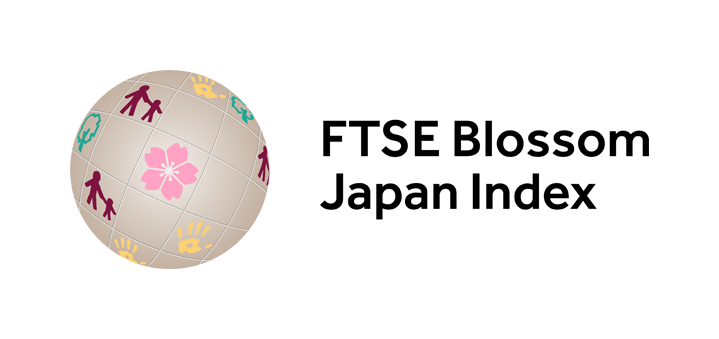
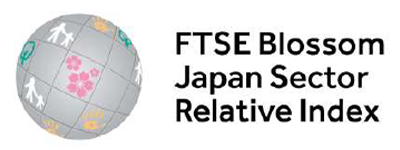
Lost-time injury frequency rate (LTIFR)
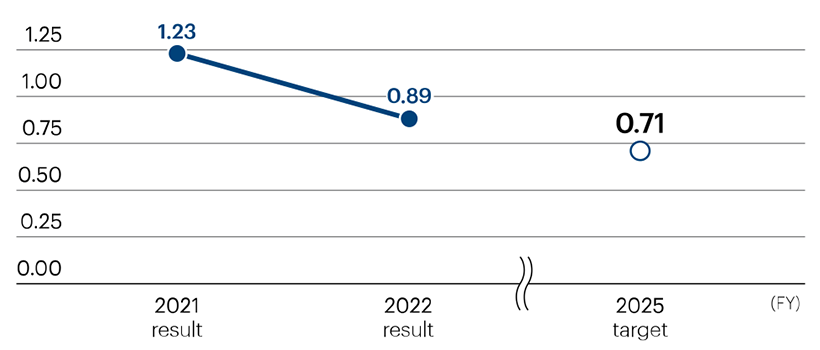
Material issues for existence / Material issues in terms of risk management
Number of accidents
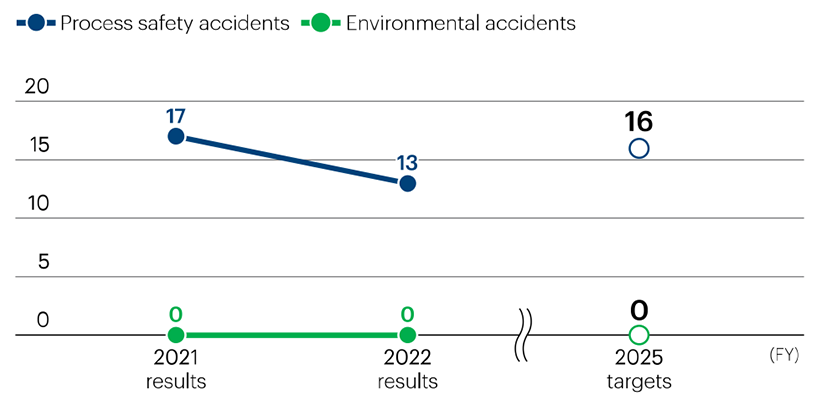
Recognizing safety assurance as a corporate social responsibility, we will continue working to prevent accidents and support ongoing operating stability.
Through risk assessment and training, regular messages delivered by management, and enhancement of safety activities in the spirit of interdependence, we will seek to instill in employees an even stronger awareness of safety in order to reduce the number of accidents and the rate of lost-time injuries.
Number of serious compliance violations
In fiscal 2022, there was one such incident against a target of zero. We take a very serious view of the incident that occurred. In addition to taking appropriate action in response, we will put in place measures to prevent recurrence under the guidance and supervision of the Chief Compliance Officer. We will also promote further compliance awareness by providing all employees with regular education and training under the Global Compliance Promotion Program, which is based on a shared global platform.
Participation rate in information security training
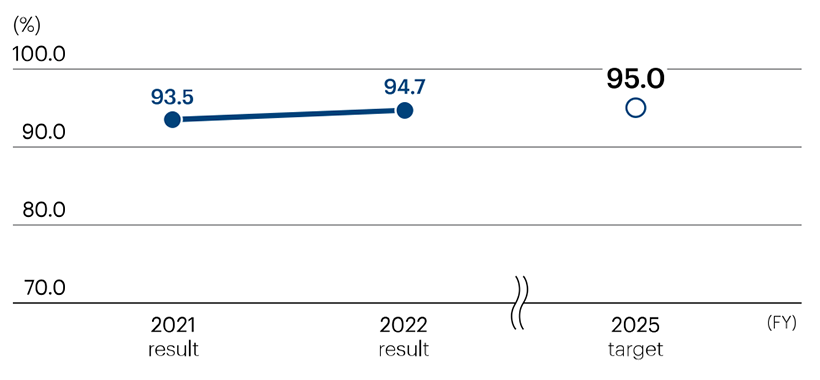
To ensure that all employees recognize the importance of protecting information assets and understand their associated responsibility, we carry out information security training every year. By reaching out repeatedly to employees who have yet to participate in the training and underlining its importance, the proportion of employees who have completed the training increases year by year. With the aim of further improvement, we will continue promoting enhanced information security awareness among employees.
